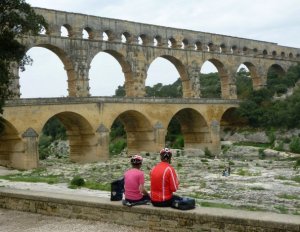In our last post, “Trip Technology Meltdown”, we left Paul cooling his fevered brow in the barge cabin, wondering how he might rescue his relationship with the wireless age … not to mention with Cheryl.
Evening drinks in an open-air bar in the old Roman Forum at Arles took care of the more important concern. How to make wireless technology serve us without becoming slaves to its incessant demands is an ongoing exercise. We hate it when interruptions from cyberspace keep us – or those we’re with – from being fully present to the joys and adventures of travel. Every device we take with us adds to luggage weight – as well as increasing potential worry over loss or theft. Traveling light and cheap has considerable advantages.
We’ve been using the Internet extensively to plan and research our travel for the past 15 years. However, only recently have we counted on mobile devices on our travels. In the past five years, we’ve rarely had a problem finding free WiFi during our time in Europe, Mexico and the Caribbean. Payphones are another matter.
Here’s our current “Travel Technology for Late Adopters”.
- Email: even before we had any mobile devices, we found it worthwhile to maintain a special email account for holiday travel only. That way we can stay in touch with those we need to, and not be distracted by all the noise from our non-traveling lives. With tiny mobile devices, we find this helps us spot what’s important. We give out our travel email address sparingly – not even the spammers have it!
- Tablet: Cheryl bought herself at 10” ASUS Eee Pad Transformer Prime Android tablet about 18 months ago. It’s adequate for on-the-road Internet research. She also has a docking keyboard – in future, we may take it with us when we travel: the lack of a real keyboard was one of my meltdown triggers while in Arles. As 80 wpm touch typists, we both have low tolerance for hunt-and-peck. Before the tablet, we had an Apple iPod Touch, received as a gift. While it was okay for occasional email, we quickly found the small screen to be too cumbersome for on-the-road researching. (We’ll write about our essential travel apps and web sites in a future post.)
- Folding reading glasses: I’ve had a pair like this for several years – one of the most useful pieces of technology I own for travel – makes the tablet or iPod or French menus usable! Is this technology, you ask? Yup, “the application of scientific knowledge for practical purposes.” (Another piece of indispensable travel technology is a key-chain battery holder for hearing aid batteries! I finally stopped running out of batteries on the road. Of course, Paul’s modern hearing aids are lead-edge technology, worth more than the rest of this list put together. Bluetooth-enabled, I think they anticipate what’s going to be said. Real-time language translation can’t be far behind. Even now, they make it possible to understand a wide variety of voices and accents.)
- Skype: we’ve had good success with skype on the tablet and the iPod, just using a basic microphone. We’ve used more skype-to-phone time than the free skype-to-skype while on the road, so keeping some phone credits in the account with “auto-recharge” is important. That way we can easily phone home, or even make cheap local calls when we have to.
- Digital camera: while most tablets and cellphones have built in cameras these days, we still like the feel of a real focusing camera with F-stops, wide-angle lens, and good optical zoom. We currently use a Panasonic Lumix DMC-ZS3 that’s a few years old. Taking the tablet’s docking keyboard will also make it possible to upload photos directly from the camera’s SD card – something we currently struggle with.
In our next post, we’ll mention a few mobile technologies we’re considering to make longer travel easier, and perhaps less expensive. As always, we’ll be asking ourselves the “appropriate technology” questions:
-
Is this new gadget really going to enhance the quality of our experience? Take a deep breath and a “time out” – now, do we still think so? Ah, come on, really!?
- What’s the cost? In up-front money? Ongoing payments? Disposal costs? Security concerns and risk? Baggage weight? In time? In unwanted distractions and information clutter?
- Are the costs really worth it? Once the novelty has worn off? After next year’s model comes out?
- Can we replace another device rather than just adding one more – and a bigger bag to carry them all in?
What is your indispensable travel technology? How do you keep information overload at bay and manage the balance between instant access and over-accessibility? We’d love to hear your thoughts.






